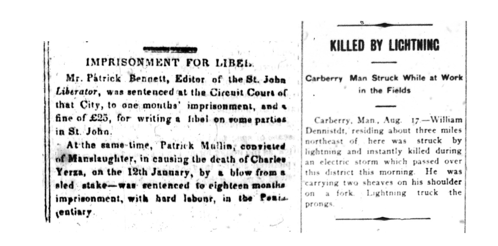By Emily Potter
Newspapers contain a wealth of information for historical researchers, but you may be surprised by how helpful they can be for genealogy research. Library and Archives Canada (LAC) holds an extensive collection of newspapers that are just waiting to be explored.
Here are a few of the ways that newspapers can come in handy when doing your genealogy.
Birth, marriage and death announcements
Birth, marriage and death records are among the most popular genealogy sources, but depending on the province, civil registration records can be restricted for up to 110 years. Researching birth, marriage and death announcements in newspapers allows you to access this information in openly available records. These announcements provide not only dates and locations for key moments in an ancestor’s life but also names of parents and other relatives.
Here are some tips to keep in mind:
- For an ancestor’s death, sometimes a short death notice will appear in a newspaper, but a much fuller obituary might appear a few days later in the same paper.
- If you are looking for a more recent obituary, many newspapers publish their obituaries online. Try searching online with quotation marks around your ancestor’s name. Search using the city name and year, if known, e.g., “Brown, George” obituary Vancouver 2005.
- Detailed birth announcements became popular only in the latter half of the twentieth century, while marriage and death announcements appeared earlier in newspapers.
- Many newspaper announcements have been indexed in a published format. If you do not know the date of an event but think that there may have been an announcement in a local newspaper, you can search in LAC’s Library Catalogue, Aurora, to see if there is a published index. Search using keywords, such as: genealogy, index and the newspaper name.

“Died,” Montreal Gazette, May 10, 1830, p. 3 (OCLC 20173495)
“Mariage à la Basilique,” Le Droit [Ottawa], April 1, 1913, p. 4 (OCLC 1081128098)
“Married,” The Palladium [Charlottetown], April 5, 1845, p. 163 (OCLC 18249106)
“Died,” The Palladium [Charlottetown], April 5, 1845, p. 163 (OCLC 18249106)
Accidents and crimes
Many researchers have family stories about ancestors involved in accidents, crimes or unusual events, but these stories can be hard to confirm. Fortunately, many of those types of events were covered in local newspapers. If you have an idea of when and where the event occurred, it may be worthwhile to peruse the area’s local newspaper. Some of these events are also referenced in published newspaper indexes.

“Imprisonment for Libel,” The Palladium [Charlottetown], February 22, 1845, p. 114 (OCLC 18249106)
“Killed by Lightning,” The Phoenix [Saskatoon], August 22, 1906, p. 6 (OCLC 16851731)
Ship arrivals
When did my ancestor arrive in Canada? This is a common genealogy question; fortunately, LAC holds passenger lists from 1865 to 1935. However, the majority of lists have not survived from prior to 1865, and it can be difficult to find immigration information for ancestors. Alternatively, most major newspapers, as well as those in coastal cities, recorded ship arrivals and departures. In rare cases, passenger names were included. The chance of finding a reference to your ancestor is higher if he or she was considered a person of importance. This information was often found in the business section of a newspaper, under Shipping News or Marine Intelligence.
The website The Ships List is a great resource for information about passenger ships and includes some lists of names found in newspapers.

“Port of Quebec,” Montreal Gazette, May 10, 1830, p. 3 (OCLC 20173495)
Social news
Many newspapers included news items about the local happenings in the town, sometimes describing when a resident had family visiting or had been travelling abroad. Although these notations do not always include genealogical information, it can be interesting to know what your ancestors were doing. Newspapers for larger cities would mainly focus on high-society individuals.

“Granby,” Sherbrooke Daily Record, June 5, 1905, p. 3 (OCLC 12266676)
“Dans Les Cantons de L’Est : Compton,” La Tribune [Sherbrooke], May 25, 1910, p. 4 (OCLC 16390877)
If you are visiting LAC, use Aurora to search and order newspapers before your visit. You can also consult the geographical list of LAC’s newspapers on microfilm (some references include a note indicating they are available online). Our Places pages also include links to websites that include digitized newspapers. As well, you can inquire at your local library about borrowing newspapers for your research.
Emily Potter is a Genealogy Consultant in the Reference Services Division of the Public Services Branch at Library and Archives Canada.

Any plans to digitize more of your newspapers?
There is no plan to digitize newspapers at this time. Follow us on our various social media channels to stay informed to get latest information on our digitization projects.
Pingback: This week’s crème de la crème — October 12, 2019 | Genealogy à la carte